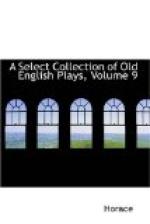JOHN. What paper’s this? the sad contents
do tell me,
My brother writ he hath broke his faith to her,
And she replies for him she hath kill’d herself.
HAR. Was that the cause that thou hast soil’d
thyself
With these red spots, these blemishes of beauty?
My child, my child! was’t perjury in him
Made thee so fair act now so foul a sin?
Hath[372] he deceived thee in a mother’s hopes,
Posterity, the bliss of marriage?
Thou hast no tongue to answer no or ay,
But in red letters write,[373] For him I die.
Curse on his traitorous tongue, his youth, his blood,
His pleasures, children, and possessions!
Be all his days, like winter, comfortless!
Restless his nights, his wants remorseless![374]
And may his corpse be the physician’s stage,
Which play’d upon stands not to honour’d
age!
Or with diseases may he lie and pine,
Till grief wax blind his eyes, as grief doth mine!
[Exit.
JOHN. O good old man, made wretched by this deed,
The more thy age, more to be pitied.
Enter SCARBOROW, his
wife KATHERINE, ILFORD,
WENTLOE, BARTLEY, and BUTLER.
ILF. What, ride by the gate, and not call? that were a shame, i’faith.
WEN. We’ll but taste of his beer, kiss
his daughter, and to horse again.
Where’s the good knight here?
SCAR. You bring me to my shame unwillingly.
ILF. Shamed of what? for deceiving of a wench!
I have not blushed,
that have done’t to a hundred of ’em?
In women’s love he’s wise that follow
this,
Love one so long, till he[375] another kiss.
Where’s the good knight here?
JOHN. O brother, you are come to make your eye
Sad mourner at a fatal tragedy.
Peruse this letter first, and then this corpse.
SCAR. O wronged Clare! accursed Scarborow!
I writ to her, that I was married,
She writes to me, Forgive her, she is dead.
I’ll balm thy body with my faithful tears,
And be perpetual mourner at thy tomb;
I’ll sacrifice this comet into sighs,[376]
Make a consumption of this pile of man,
And all the benefits my parents gave,
Shall turn distemper’d to appease the wrath
For this bloodshed, that[377] I am guilty of.
KATH. Dear husband!
SCAR. False woman, not my wife, though married
to me:
Look what thy friends and thou art guilty of,
The murder of a creature equall’d heaven
In her creation, whose thoughts (like fire)
Never look’d base, but ever did aspire
To blessed benefits, till you and yours undid her:
Eye her, view her; though dead, yet she does look
Like a fresh frame or a new-printed book
Of the best paper, never look’d into
But with one sullied finger, which did spot her,
Which was her own too; but who was cause of it?
Thou and thy friends, and I will loathe thee for’t.




